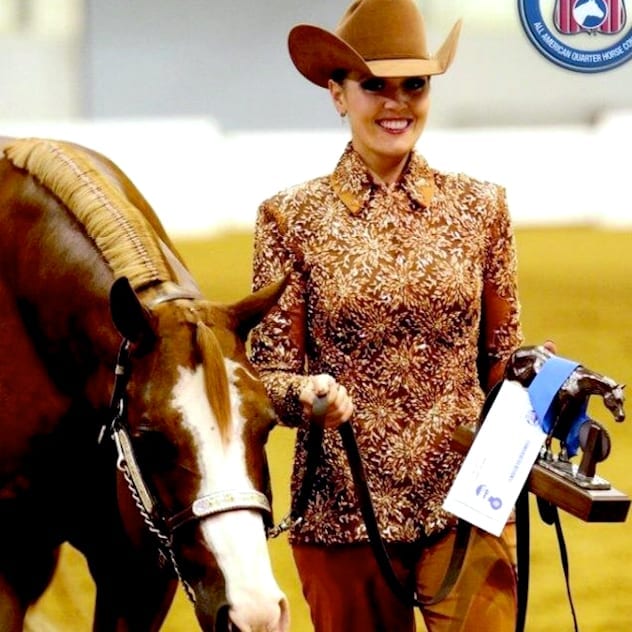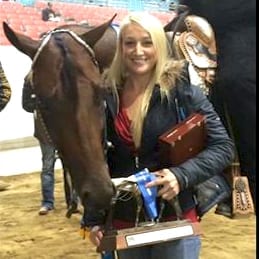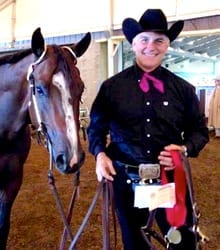Does winning the Congress give exhibitors a competitive edge heading into the World Show? Is it better to be the Top Dog or the Underdog when it comes time to vie for that illusive World Championship title? While thousands of us partake in showing at the Congress, only the elite few continue on to compete in Oklahoma City. The most successful competitors will tell you that rest and preparation are keys to a successful transition from Congress Champion to World Champion.
Whitney Walquist-Vicars of Cleburn, TX rode Southwestern Gunman to win the Amateur Horsemanship at the 2014 Congress. She admits that reconditioning both horse and rider from one major show to succeed again at the World Show can be challenging. “It’s definitely hard. I’ve been trying to get rested since coming home from Congress and have given my horse a little rest too. Then we’ve spent time practicing at home as we always do, focusing a little more on the areas I would like to improve on from Congress.”
 Amateur Kaleena Katz Weakly of Shelbyville, Illinois knows all too well about trying to conquer it all. After showing her two horses to Congress wins this year, Hours Yours and Mine in the Amateur Showmanship and Caught Me Looking in the Non-Pro Maturity, she had to return to real life and being a busy mother of a nine month-old. Attaining much needed sleep and catching up on laundry were her first priorities. But she never took her focus away from the upcoming World Show. “I try to stay healthy and keep to my exercise routine as well, so I have energy and endurance to care for my baby and jump back into show mode,” Kaleena reveals. “I headed to the World Show two days early to get some needed practice time in before my first class. Good health is so important for both people and horses in this stressful time of competition.”
Amateur Kaleena Katz Weakly of Shelbyville, Illinois knows all too well about trying to conquer it all. After showing her two horses to Congress wins this year, Hours Yours and Mine in the Amateur Showmanship and Caught Me Looking in the Non-Pro Maturity, she had to return to real life and being a busy mother of a nine month-old. Attaining much needed sleep and catching up on laundry were her first priorities. But she never took her focus away from the upcoming World Show. “I try to stay healthy and keep to my exercise routine as well, so I have energy and endurance to care for my baby and jump back into show mode,” Kaleena reveals. “I headed to the World Show two days early to get some needed practice time in before my first class. Good health is so important for both people and horses in this stressful time of competition.”
 Johnna Letchworth of Harwinton, Connecticut won the Amateur Hunt Seat Equitation at the Congress aboard Izzy A Jack Bar. She too gives her horse five days off to rest and turnout “just to be a horse”. Then, it is back to routine for the pair, “I don’t change anything. I practice and prepare like I always do. It’s another horse show, another pattern and it is necessary for me to have confidence in myself and my horse in order to be the best we can be.”
Johnna Letchworth of Harwinton, Connecticut won the Amateur Hunt Seat Equitation at the Congress aboard Izzy A Jack Bar. She too gives her horse five days off to rest and turnout “just to be a horse”. Then, it is back to routine for the pair, “I don’t change anything. I practice and prepare like I always do. It’s another horse show, another pattern and it is necessary for me to have confidence in myself and my horse in order to be the best we can be.”
While both shows are significant to the industry, the Congress and the World Show have often been described as portraying very different images. Some tend to see the Congress as a bit more conservative and traditional whereas the World Show represented the upcoming trends in judging styles, patterns and where exhibitors tended to lay it all out on the line.
However, at this year’s Congress, western pleasure events were particularly noticed for the impulsion and forward motion of the gaits and the level headsets as AQHA has been promoting. Some may have even called it a “Statement Congress” promoting even more the new standards for performance that AQHA has been encouraging.
 Jenna Dempze, who was Congress Champion Amateur Western Pleasure with her horse Rewind and Repeat says, “I feel like each year the industry as a whole is trying to better itself and that is reflected in the quality that is presented at the shows. I think everyone is concerned with positivity for the industry. We are trying to bring out the best of our individual horses and be mindful of what is expected. All year we’ve been focused on what works best for my horse to look his best, and I think we have a system that works, so we’ll follow the same game plan as we have been.”
Jenna Dempze, who was Congress Champion Amateur Western Pleasure with her horse Rewind and Repeat says, “I feel like each year the industry as a whole is trying to better itself and that is reflected in the quality that is presented at the shows. I think everyone is concerned with positivity for the industry. We are trying to bring out the best of our individual horses and be mindful of what is expected. All year we’ve been focused on what works best for my horse to look his best, and I think we have a system that works, so we’ll follow the same game plan as we have been.”
Charlie Cole of Highpoint Performance horses adds, “I think it’s been very clear for many years what to expect at the World Show in all classes, especially the western pleasure. In the past, I much preferred showing western pleasure at the World Show, but at this year’s Congress, I thought the judges did a good job with gait calls and the classes looked better.”
 Dan Yeager, a client of Highpoint also said he had more fun showing the western pleasure classes this year at the Congress due to the increased forward motion. “I appreciated it and applaud the judges for calling for the full completed gaits. It was just so enjoyable to ride.”
Dan Yeager, a client of Highpoint also said he had more fun showing the western pleasure classes this year at the Congress due to the increased forward motion. “I appreciated it and applaud the judges for calling for the full completed gaits. It was just so enjoyable to ride.”
Yeager had a successful Congress winning the Select Amateur Showmanship and being reserve in both the Novice Amateur Western Pleasure and the Select Amateur Western Pleasure. He looks forward to competing at the World Show as he normally attends the Select World. After the Congress, Yeager says that it is necessary for him to take some time away from the equine community, not only for business purposes but also just to unwind. He says, “It’s important for me that the horses get some down time too. We give them a week off to rest then get back to work. It is necessary to maintain the longevity of the horse.”
 Affiliate trainer at Highpoint, Brad Ost won the Senior Trail at the Congress showing Chex Me Im Cute to victory. He agrees that the World Show and the Congress are both high-pressure shows in various ways. To prepare he says, “I like that they did the extended gears in the pleasure. But they have done that at the World Show for as long as I can remember. I’m glad they are enforcing it at other shows. I treat the Congress and the World Show both very similar. They are both extremely competitive and prestigious. I want to be at the top of my game at both.”
Affiliate trainer at Highpoint, Brad Ost won the Senior Trail at the Congress showing Chex Me Im Cute to victory. He agrees that the World Show and the Congress are both high-pressure shows in various ways. To prepare he says, “I like that they did the extended gears in the pleasure. But they have done that at the World Show for as long as I can remember. I’m glad they are enforcing it at other shows. I treat the Congress and the World Show both very similar. They are both extremely competitive and prestigious. I want to be at the top of my game at both.”
 Kenny Lakins and his wife, Ashley of Wilmington, Ohio, had a wonderful Congress celebrating the win aboard One Lazy Investment in the Senior Western Pleasure and Open Maturity and Reserve Champion in the Junior Western Pleasure with Forever My Lady. Together, they suggest, “The Congress is a wonderful show in its own category. To win the Congress is a huge deal. I think that the Congress might be just different than the World Show but not conservative at all. The World Show always has its stuff that we have to do other than just normal gait calls. I think that’s why they say World Show pushes the limits. You have to be ready to do all that they will ask for, and do it perfect.”
Kenny Lakins and his wife, Ashley of Wilmington, Ohio, had a wonderful Congress celebrating the win aboard One Lazy Investment in the Senior Western Pleasure and Open Maturity and Reserve Champion in the Junior Western Pleasure with Forever My Lady. Together, they suggest, “The Congress is a wonderful show in its own category. To win the Congress is a huge deal. I think that the Congress might be just different than the World Show but not conservative at all. The World Show always has its stuff that we have to do other than just normal gait calls. I think that’s why they say World Show pushes the limits. You have to be ready to do all that they will ask for, and do it perfect.”
Congress Champion in Junior Western Riding this year with Huntin My Zipper, Jason Martin agrees, “I feel the Congress and World Show are the same as the level you have to be at to win. It’s the same trainers on the same horses with a few exceptions. You need to be on your ‘A’ game to win the Congress and you need to be on your ‘A’ game to win the World Show.”
His business partner Charlie Cole also concurs, “I don’t think you can really hold back in competitions against the very top horses in any event. So, at Congress and the World Show, I’m trying to have the best go I can. Now, the go-round at the World I might play it a little safe but not in the finals.”
 However, after a big victory at the Congress, it would be acceptable to assume that many competitors would feel the pressure heading into the World. That is not the case for Congress Champion Blake Weis who won the Junior Green Trail aboard Snap Krackle Pop. He states, “I really don’t feel any pressure going into the World Show simply because I don’t feel like one show should categorize how good a horse and rider are. Horses and people both make mistakes whether it be at a large or small show–it happens.”
However, after a big victory at the Congress, it would be acceptable to assume that many competitors would feel the pressure heading into the World. That is not the case for Congress Champion Blake Weis who won the Junior Green Trail aboard Snap Krackle Pop. He states, “I really don’t feel any pressure going into the World Show simply because I don’t feel like one show should categorize how good a horse and rider are. Horses and people both make mistakes whether it be at a large or small show–it happens.”
For Amateur Equitation Congress Champion Johnna Letchworth, she feels no pressure at all. Perhaps because she did not qualify for equitation at the World Show and only entered the class at the Congress for practice and for fun; little did she foresee her victory. Therefore, at the World Show she is focusing on her other talents such as horsemanship and trail, “At big shows it means a lot for me to make the finals. I appreciate every victory I have and be sure I am prepared so I can relax, enjoy the ride and have fun.”
 Whitney Vicars shares her calm attitude, “I feel very blessed and thankful for the success we had at the Congress but I don’t really feel more pressure because of it. The World and Congress is what we all work towards all year and we all want to be at our best if possible for both. So the World show, to me, brings pressure regardless of what happened at the Congress. It’s a whole new show and anything can happen.”
Whitney Vicars shares her calm attitude, “I feel very blessed and thankful for the success we had at the Congress but I don’t really feel more pressure because of it. The World and Congress is what we all work towards all year and we all want to be at our best if possible for both. So the World show, to me, brings pressure regardless of what happened at the Congress. It’s a whole new show and anything can happen.”
So does winning the Congress give exhibitors that competitive edge heading into the World Show? Is it better to be the Top Dog or the Underdog when rolling off one prestigious show to a World Championship?
Despite winning, Vicars maintains a humble attitude, “I don’t really think of myself as either. I know the Lord has blessed me with a great horse and support team. I have much respect for my fellow competitors. The amateur competition today is very tough and several of us could be the winner on any given day. I think it is very important to never underestimate your competition. The World Show is a whole new ballgame. We will try our very best and let the Lord do the rest!”
 Cole takes a more pragmatic approach, “I try to be realistic. I have underdogs and top dogs and on the right day anyone of them can win. I’m just going to try to ride each horse to the best of my ability and be as prepared as possible.”
Cole takes a more pragmatic approach, “I try to be realistic. I have underdogs and top dogs and on the right day anyone of them can win. I’m just going to try to ride each horse to the best of my ability and be as prepared as possible.”
Blake Weis suggests, “I prefer to be right in the middle. Being the underdog you lack confidence, and being the top dog I feel like a lot of people get a big head and lose their work ethic that got them to the top in the first place.”
Jason Martin likes to be the silent threat. “I actually like being the underdog going into the World Show. Even though I won the Congress, I don’t feel like I am the one to beat. I may be one of the ones to beat but there are some very nice junior horses this year and on any given day any of them could step up and win.”
While Kenny Lakins and his wife love winning, they don’t mind sharing the spotlight with other great competitors, “We like just being the people who show great horses and have fun doing it. It’s nice to be on top, but a lot of times it’s short lived.”
GoHorseShow.com wishes all exhibitors and spectators the best of luck at the World Show. May your dreams come true and your travels be safe.
About the Author: Mo (Maureen) West grew up on a large vegetable farm in rural Ontario, Canada where she began riding and showing quarter horses as a child. Her interests mostly include all-around horses that lean toward hunter under saddle events. While continuing to compete in the quarter horse circuit across the province, Mo graduated from the University of Western Ontario and subsequently D’Youville College. She excelled at her career for 14 years as a high school English teacher and Department head. She now lives with her husband in Dublin, California.








